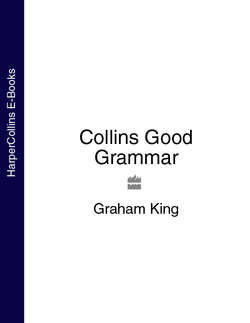Читать книгу Collins Good Grammar - Graham King - Страница 24
Verbs
ОглавлениеVerbs are all about doing and being. They’re action words. They’re the engines that drive sentences to make them do something. Imagine trying to get through a day without these workhorses:
wake, woke, eat, drink, walked, drove, go, talked, do, keep, appear, exist, become, sleeps, dream
You can see, even from these few examples, that verbs take several forms, some ending in -s, -ed, and so on, and in fact most verbs have four or more forms to help us grasp when an action is taking place:
eat, eats, eating, eaten, ate
write, writes, writing, wrote, written
If you look up the words eats, eating, eaten or ate in a dictionary you may have difficulty finding them. However you will find them in the entry following the basic verb eat, which is called the headword, along with derivatives such as eatable, eater, eating house, eatables, eat out, eat up, eat one’s heart out, etc.
Apart from their multiplicity of forms, verbs are notoriously variable: they can be regular (where they follow certain rules) and irregular (where they don’t); they can be main verbs or auxiliary verbs, transitive and intransitive, finite and infinite. But don’t let these grammatical gremlins scare you because they will be exposed for the poor, simple workaholics they are in the section on verbs on page 95.
